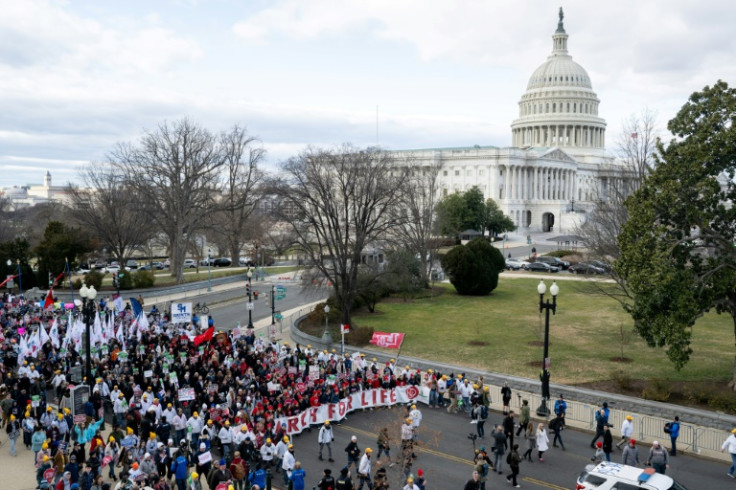'The Battle Is Not Over': US Anti-abortion Groups Dig In For Fight Ahead

It was their first march through the US capital since the Supreme Court gave them what they had been demanding for half a century -- but for anti-abortion activists gathered in Washington Friday, the mood was more dogged than triumphant.
Seven months after the nation's highest judicial body gutted federal protections for nationwide abortion access, protesters outside the conservative-led institution allowed themselves a modest victory lap -- but most were focused on the fights ahead.
"We have a lot of work to do," said George Muench, a 74-year-old Catholic in a "March for Life" hat.
The march began in 1974 as a challenge to Roe v. Wade, a landmark Supreme Court ruling the previous year that guaranteed the right of American women to terminate their pregnancies.
Every January, activists from across the United States have descended upon the capital to walk to the courthouse's iconic front steps to urge the justices inside to reverse that decision.
On June 24 last year they got their wish. The high court, which had lurched to the right under hardline Republican former president Donald Trump, relented -- giving states the freedom to pursue their own abortion bans.
More than a dozen states immediately rushed to do exactly that.
For Barbara Countryman, who has not missed a "March for Life" in 20 years, the ambience was a touch more jubilant and the crowd a little younger than in previous years.
"We are celebrating the end of Roe, but we still have to convert all people's minds," she told AFP, surrounded by college students and teenagers, many of whom who had been bussed in by their Christian schools, with some brandishing banners that read: "I am the post-Roe generation."
But for 61-year-old Countryman, who regularly prays in front of clinics in her home state of Maryland, the slog is only beginning.
"I'll be here every year until I die. It's never going stop -- it will always be a battle," she said gravely.
"The debate around abortion is back into the states' hands," adds Richard Guill, a 50-year-old resident of Virginia, where a tussle over abortion access has ground into an entrenched stalemate between the Republican governor and the less conservative legislature.
Kathleen Pilie, 78, from New Orleans, is happy that Louisiana immediately enacted an abortion ban with no exceptions.
"Many states have abortion on demand still... the battle is not over for sure," she told AFP, cautioning against complacency in the long struggle for "hearts and minds."
As determined as Friday's "March for Life" crowd was, their position is in the minority in modern America.
Referendums on reproductive rights held since June have all been won by abortion rights advocates, including in conservative states like Kansas and Kentucky.
"Democrats turned it into a political issue, put a lot of money into the campaign and promoted the dangers of not having abortion rights," Muench complained.
Rosario Cazares, who flew to Washington from Texas with her mother Virginia, acknowledges there are unpopular elements of the anti-abortion stance -- under some states' laws, abortions are not allowed even in cases of rape or incest.
For the 27-year-old public health student, though, the debate is not a zero-sum struggle, but an opportunity to work for a more just society.
"We also have to make sure that we are helping these women," she said, calling for more assistance for young mothers.
Cazares said she wants to open her own "pregnancy center" one day. In the meantime, the fight goes on.
"We will march year after year," one speaker told the crowd outside the Supreme Court.
From Sunday, the 50th anniversary of the Roe v. Wade decision, the other side gets its turn, with pro-abortion rights demonstrators planning to rally in cities across the country.

© Copyright AFP 2024. All rights reserved.





















